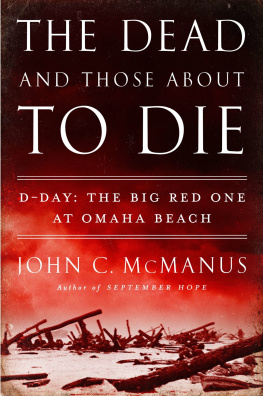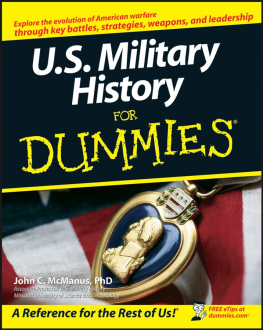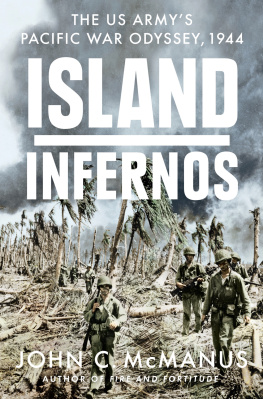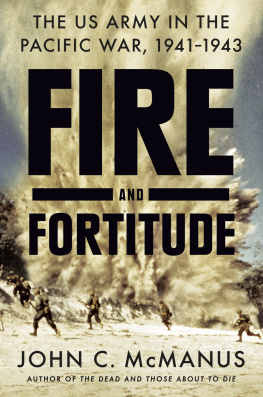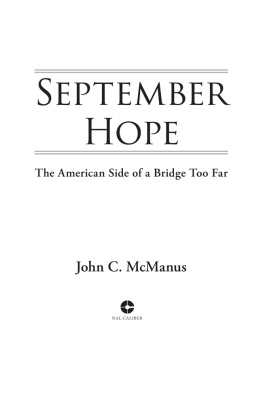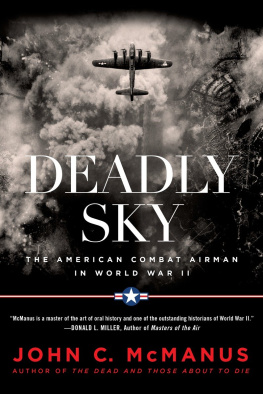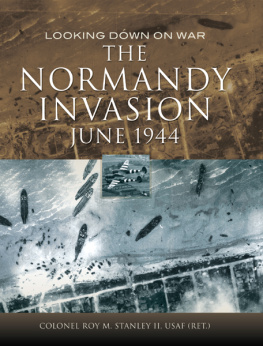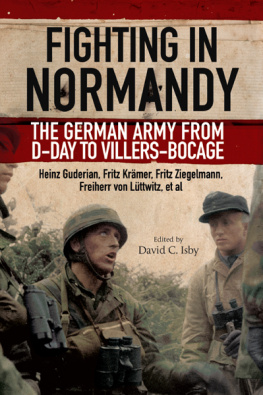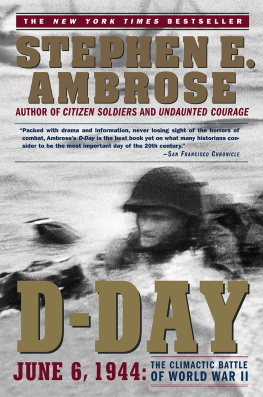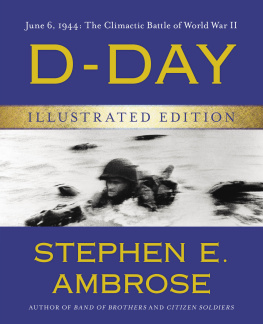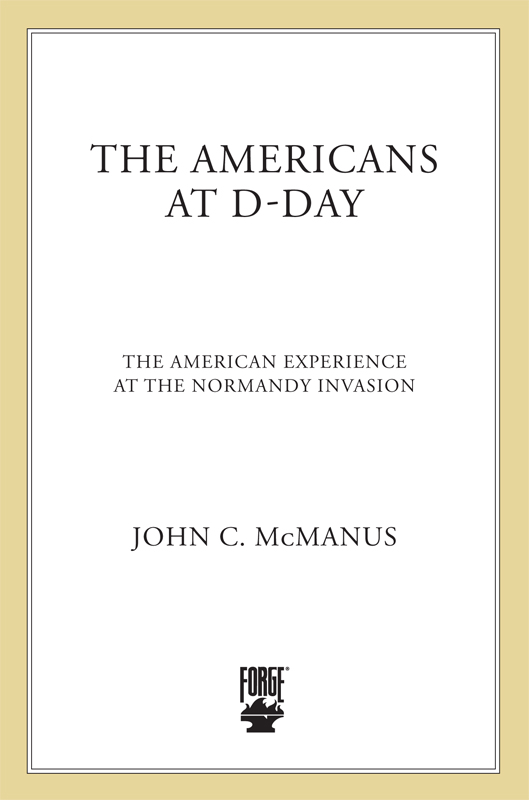
The author and publisher have provided this e-book to you without Digital Rights Management software (DRM) applied so that you can enjoy reading it on your personal devices. This e-book is for your personal use only. You may not print or post this e-book, or make this e-book publicly available in any way. You may not copy, reproduce, or upload this e-book, other than to read it on one of your personal devices.
Copyright infringement is against the law. If you believe the copy of this e-book you are reading infringes on the authors copyright, please notify the publisher at: us.macmillanusa.com/piracy.
Contents
For Michael and Mary Jane McManus
With Enduring Gratitude
LIST OF MAPS
ACKNOWLEDGMENTS
From the earliest I can remember, I have been fascinated with Operation Overlord and the Battle of Normandy. Something about this epic battle has captivated my attention and made me curious to know as much as possible about the fighting. The excellent work of historians such as Forrest Pogue, Stephen Ambrose, Carlo DEste, Robin Neillands, Gordon Harrison, Martin Blumenson, Max Hastings, and many others only served to stoke my curiosity even more. I have made several visits to Normandy, and each time I go, I come away with a sense of the battles importance in modern history. Gradually, I have come to believe that Normandy was the harbinger of todays world. Over time, it occurred to me that a fundamental aspect of the battlethe American contributionhad not been written about with the kind of focus, or the kind of depth, it deserves. The rise of the United States as a world power, and the significant impact that U.S. soldiers had on the battles outcome, is, in my view, the defining aspect of the story of Normandy.
So I decided to embark upon a project that focused exclusively on the American experience in the invasion and the ensuing battle. My hope is that, with this volume and the one that follows, I will have afforded the reader a comprehensive view of the impact the United States had on one of the pivotal battles of World War II.
The research and writing of a book like this was a substantial, time-consuming undertaking. Many dedicated, helpful individuals have made it possible. Doug Brinkley and his staff at the Eisenhower Center in New Orleans welcomed me as one of their own during my visit. They helped me any way they could, gave me tremendous freedom of access, and provided excellent guidance through their remarkable collection of World War II oral histories. Their collection is, in my opinion, among the very best sources of firsthand accounts from American veterans of that war. At the University of Illinois archives, Ellen Swain helped me navigate an extensive collection of documentary material from the 3rd Armored Division. I am thankful for her time and patience. Ronald Marcello, a first-rate oral historian at the University of North Texas, agreed to send me transcripts of several interviews he did with Normandy veterans. His probing, intelligent questions drew many pertinent and important details from these veterans and added to the quality of this book. Christopher Koontz, his assistant, handled the logistics of sending me the transcripts, and I appreciate his efforts. Jay Graybeal, at the United States Army Military History Institute, provided much help in finding good photographs.
The University of MissouriRolla, where I teach, is blessed with an excellent interlibrary loan department. In the preparation of this book, I ordered hundreds of books or articles through interlibrary loan. Scott Peterson and several members of the library staff tirelessly processed every request. Often they went out of their way to find rare material for me. Without their efforts, this book would not have been possible.
The History Department at UMR provided me with financial support for my travels. I would like to thank my colleagues in the department for their advice, support, and friendship. Wayne Bledsoe, Jack Ridley, Tseggai Isaac, Pat Huber, Jeff Schramm, Michael Meagher, and Harry Eisenman have contributed their unique perspectives on a range of issues. Special thanks go to Larry Gragg for his cheerful wisdom, Diana Ahmad for giving me information on her uncle, a glider pilot who flew into Normandy on D-Day, and to my mentor, Russ Buhite, for his constant guidance. Each and every day, Russ gives me a larger-than-life role model to emulate. The same can be said of Tom Fleming. I would like to thank him for many years of encouragement and support.
I am grateful to my editors at Forge for their professionalism and good cheer. Brian Callaghan handled many of the unglamorous details of manuscript format, copying, pre-production, and the like, as did Eric Raab. I appreciate their steady guidance. I am grateful to Bob Gleason for his practiced, experienced editorial view. Bob knows the publishing industry inside and out, and he proves it in all of our conversations. In this book, he knew what to change and what to leave in place. I consider myself fortunate to work with him. Along these same lines, thanks go to Ted Chichak, my literary agent. From the start, he believed in this project, shaped it, and helped me bring it to fruition. Thanks, Ted.
My friends and family have had a substantial impact on this book. Ed Laughlin, a close friend who is a veteran of the 82nd Airborne Division, provided me with much good information on his divisions experiences in Normandy. Many thanks to Mark Williams, Sean Roarty, Bob Kaemmerlen, Mike Chopp, John Villier, Steve Kutheis, Ron Kurtz, and Dave Cohen for their friendship and their influence on me.
My biggest debt of gratitude goes to my family. My in-laws, Ruth and Nelson Woody, Nancy and Charlie Swartwout, Doug, David, Angee, Tonya, and the kids are all very special people. I am honored to be associated with the Woody family and grateful to all of them for their constant warmth and humor. My brother, Mike, is a fellow military-history enthusiast who is often willing to tolerate my long discourses on my research. I am thankful for his patience and his extensive knowledge of history. I would like to thank my sister, Nancy, her husband, John, and my nieces, Kelly and Erin, for their affection and their tolerance of an uncle/brother/brother-in-law whose mind is often deep in the past. Michael and Mary Jane McManus, my parents, to whom I have dedicated this book, deserve special praise for any success I have had or may have. I hope that this book will serve as an enduring monument of appreciation for everything they have done for me. The last, and largest, debt of gratitude naturally belongs to my loving wife, Nancy. Over the course of many hours, she scoured countless photo archives until she found exactly the right blend of illustrations for this book. In addition, she was a source of constant support and understanding during my seemingly endless hours of research, rumination, and writing. She shares my passion for history and understands me in her own special way. This book is hers as much as it is mine. That being said, any errors are my responsibility and mine alone.
J OHN C. M C M ANUS
St. Louis, Missouri
September 1, 2003
PROLOGUE
The Battle of Normandy was the pivotal moment of World War II in Europe. It represented Germanys last chance to end the war on any sort of favorable terms. The idea that Germanys eventual fate was sealed from 1942 onward, when it faced the Grand Alliance of Britain, the United States, and the Soviet Union, is, quite simply, wrong. Allied manpower and industrial and material advantages did not guarantee victory. History is replete with examples of lesser powers triumphing over their better armed, fed, and supplied adversaries. The GreekPersian Wars, the English victory at Agincourt, and the American revolutionary triumph against Britain, the worlds most powerful nation in the late eighteenth century, are but a few examples. In the modern era, such stunning upsets as the Israeli triumph in the 1948 War of Independence, the Vietnamese communist victory over French and later American adversaries, as well as the victory of the ragged but dedicated mujahideen over the Soviet Union all proved that logistics alone do not win wars.


